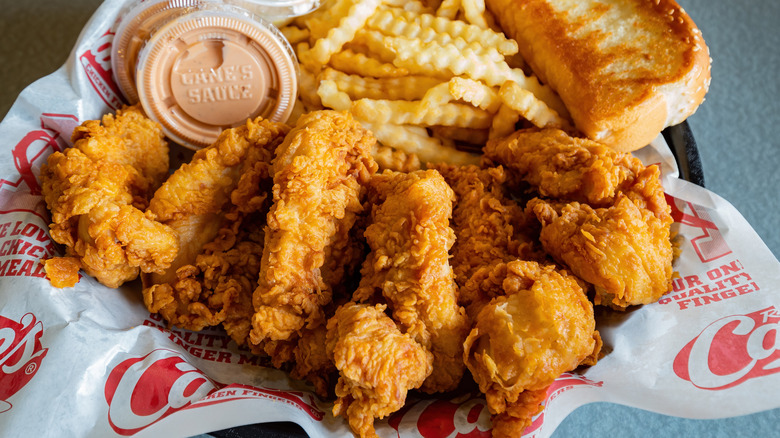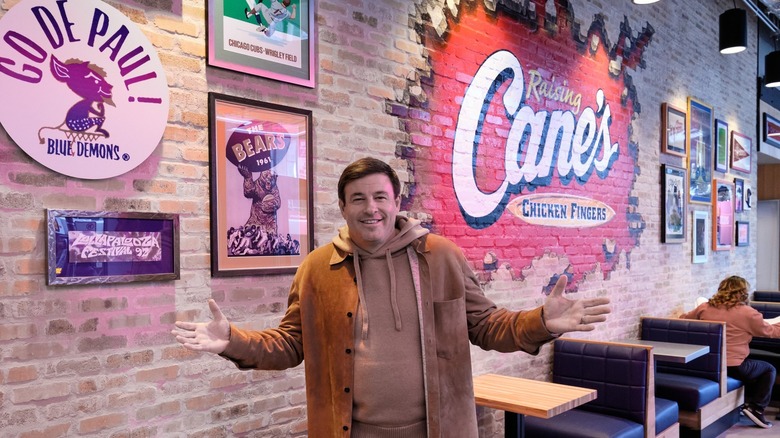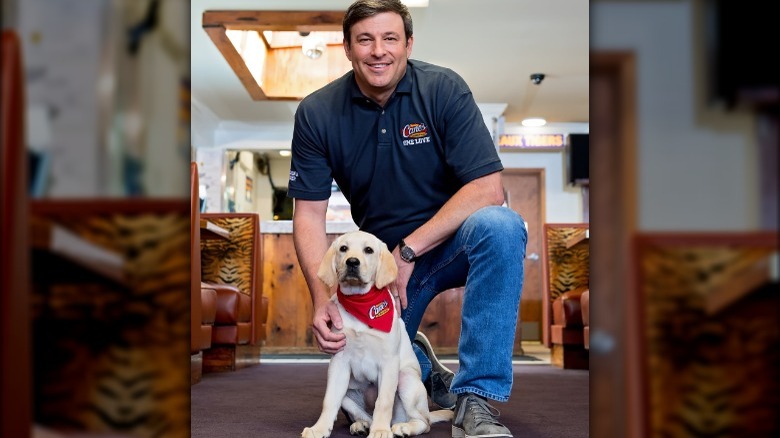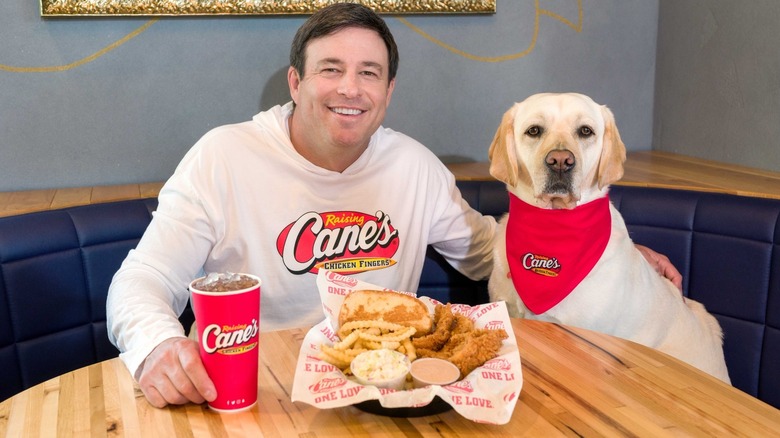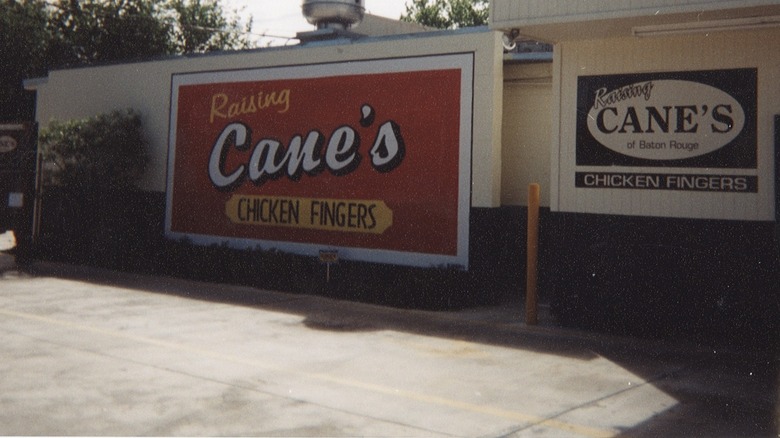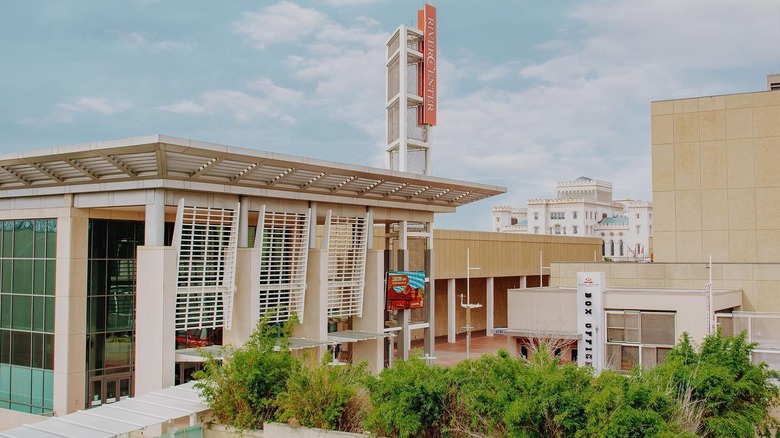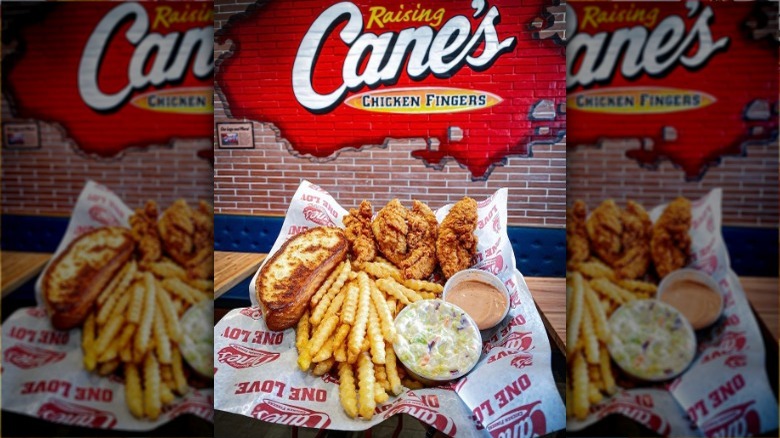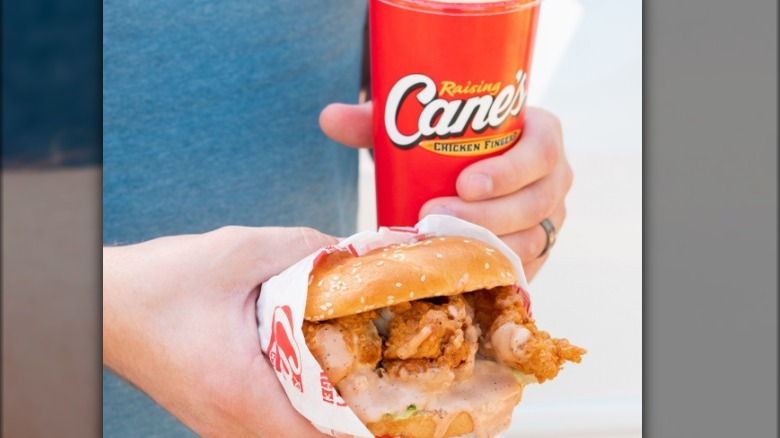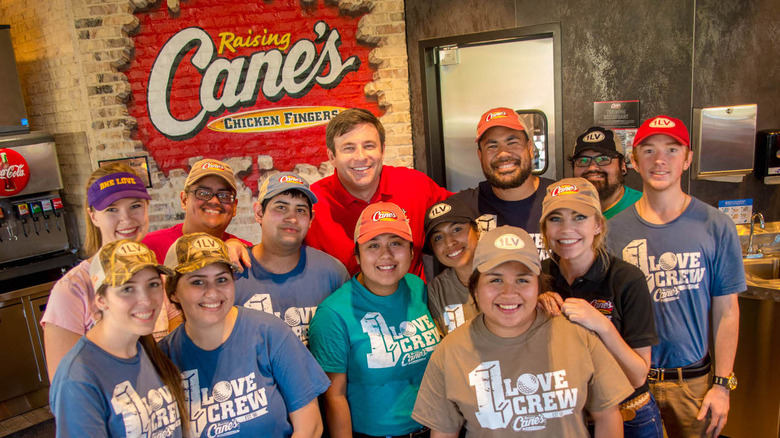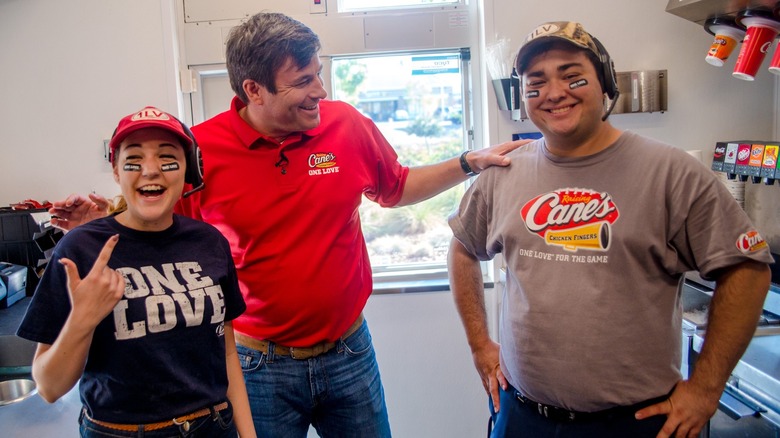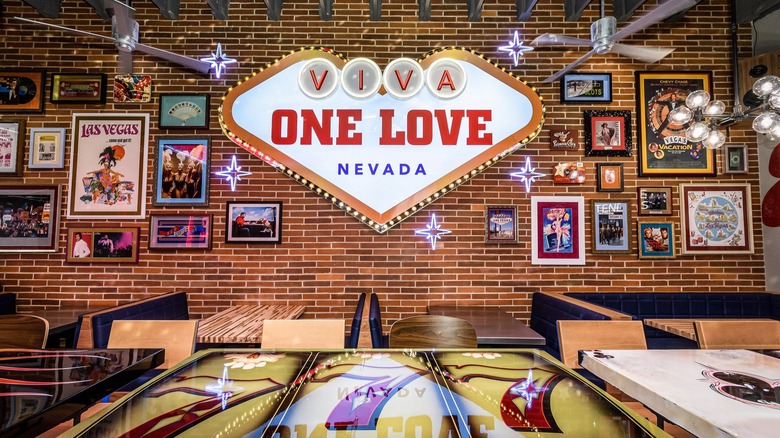11 Facts About Raising Cane's Only True Fans Know
If you drive past any Raising Cane's location around lunchtime, you are likely to see a strange sight. It's a line of cars so long that it's starting to back up traffic! If you've never eaten there, it can be hard to understand why a place that only sells chicken fingers seems to be so popular. But ask any true Raising Cane's fan and you'll get the same answer: the food is so delicious. We don't know what the team there puts in the famous sauce, but it's the stuff dreams are made of. The chain is popular with college kids and retirees alike for its quick service, cute mascot, and yummy food.
In fact, Raising Cane's has so many fans that the restaurant even has a special name for them — Caniacs. If you find yourself craving the sweet and tangy kick of the famous Raising Cane's sauce, you can join the Caniac Club for a free meal upon signing up, deals and rewards throughout the year, and even a birthday treat. But the real Raising Cane's devotees know that the appeal and intrigue of the famous chicken chain doesn't stop there. The store has the most interesting international locations, a generous founder, and a wild origin story. Read on for all the facts about Raising Cane's that only true fans know.
1. The idea for Raising Cane's was a college assignment that got a bad grade
True fans of Raising Cane's know that the restaurant almost never became a reality. According to Louisiana State University, the idea for the concept came about when founder and CEO Todd Graves was a student at the school. He partnered with classmate Craig Silvey to create a business plan for a class assignment. The pair dreamed up a restaurant that only sold chicken fingers. Graves had great faith in the idea that to be successful, you don't have to have a large menu with an abundance of items. Instead, you just should do one thing and do it well (via Living New Orleans). Unfortunately, his professor didn't share his feelings. The pitch for what would one day become Raising Cane's got the lowest score in the class.
Luckily for us, Graves didn't take the rejection personally. He knew he was onto something and pushed forward with his idea after graduation. These days, things have been patched up between LSU and Raising Cane's. The two are now partners in education. Employees can qualify for a tuition reimbursement program for up to $5,250 annually. The courses must be taken online, but can be for a bachelor's or master's degree, as well as specialized professional development programs, per LSU. Even though the university didn't give Graves the winning grade, it's now giving other students the same opportunity to dream big — no matter what their professor says.
2. Founder Todd Graves worked in Alaska to earn seed money
After he graduated from Louisiana State University, Raising Cane's founder Todd Graves wanted to make his chicken finger dream a reality. He knew he needed plenty of money to turn the idea into a real restaurant. He asked a few banks in Louisiana for the start-up money, but just like his professor, they all told him no. So to earn the cash, he started working 90 hours a week as a boilermaker in Los Angeles instead, per the restaurant. The work at the oil refinery was exhausting, but it paid well. Graves then learned from a coworker that if he took his skills and worked on fishing boats up in Alaska, he could make even more money. So he moved up north.
After two years of intense physical work, he had enough money for banks to take him seriously. He went back to Louisiana and received a loan. According to New Orleans Living, Graves attributes his success to using his own hard-earned money to start up the first location, instead of raising all the seed money from investors. "The restaurant is my dream. It means something to me," he said, adding, "You can tell if a business is driven by its founder. If it's driven by a venture capitalist, it's just a financial transaction." And as a thank you to Alaska for its role in his success, Graves opened a location in Anchorage (via Alaska News Source).
3. Raising Cane's gets its name from a special pup
When Todd Graves was trying to think of a name for his chicken finger joint, Raising Cane's wasn't actually his first choice. According to the restaurant, his first choice was actually "Sockeye's." He chose this because it's the name of the type of salmon he was fishing in Alaska while he raised his seed money. However, a friend of Graves' didn't like that name much. Instead, he told Graves he should consider using the name of his loyal yellow labrador, Cane.
Cane was always around the construction site of the first location, just outside LSU's North Gate. He was already their mascot of sorts, so the helpful friend thought it only made sense to name the place after the dog. Thus, Raising Cane's was officially born. Since then, there have been a few different Canes in the Graves family, each with its own unique flare. The original Cane lived a short but meaningful life from 1992 to 1998, per the restaurant. When you see a photo of a dog at your local spot, it's probably him. His successor Cane II lived from 1999 to 2016 and was in charge of being the best girl at the corporate office. Since 2017, Cane III has been ruling the roost, providing cuteness and mischief at all corporate events.
4. The original location is called The Mothership
The legacy of Raising Cane's will forever be linked to Louisiana State University. From the class project that sparked the chicken finger revolution to the popularity of the first location, you can't separate the two. Founder Todd Graves likes it that way. "I love this community, you know. I'm a Baton Rouge boy, and I've been an LSU fan since I've been a kid," Graves told the LSU Alumni Association, adding "I chose to open the first Raising Cane's at the North Gates of LSU because I just love it so much."
"The Mothership" as Graves likes to call it, celebrated its 25th birthday on campus in August 2021. On August 28, 1996, Graves opened the doors to his dream at 3313 Highland Road. Despite his professor saying his idea would never work, LSU students were so excited about eating chicken fingers that Graves and his team had to stay open late to meet the demand. The team ended up closing at 3:30 a.m. that day. So every Thursday, Friday, and Saturday night since then, the Mothership closes at the same time, in a nod to their grand opening, and as a treat to the local college students they aim to serve. Most other locations close around 11:00 pm, so this first location is unique.
5. Baton Rouge hosts a Raising Cane's convention center
If visiting a Raising Cane's restaurant location doesn't quite hit the spot, superfans can now visit an entire convention center boasting the company's logo. According to The Advocate, the brand signed a ten-year, multi-million dollar lease with the Baton Rouge Parish government in 2016. Raising Cane's pays the local government for naming rights, and to advertise on and throughout the building, while the city can use the funds for maintenance and jobs.
The Raising Cane's River Center is a popular place to gather in downtown Baton Rouge. It has a 10,000-seat arena for rallies, concerts, and sporting events, as well as a nearly 2,000-seat theater for smaller shows, a Grand Ballroom, and an Exhibition hall. All together it makes up a 200,000-square-foot convention center. We can only hope that one day there will be a massive Raising Cane's restaurant of the same size. The space is used often, as the Baton Rouge Symphony Orchestra, Baton Rouge Ballet, and the Broadway in Baton Rouge program all use the center as their performance space.
6. Only store managers know what's in the famous sauce
Fans of Raising Cane's might love the crispness of the chicken tenders; perhaps they can't get enough of the smooth, buttery taste of the Texas Toast that comes with each meal; they might even enjoy the tangy coleslaw included in the Box Combo. But let's face it — most people go to Raising Cane's for the Cane's sauce. But if you are a superfan and want to create the sauce at home, don't think getting a job as a fry cook will let you access the recipe. The chain says only the restaurant's general managers are allowed to know what's in the sauce. That's right, not drive-thru superstars, not even shift managers — only the top dogs.
However, there's a chance the secret may have gotten out. In 2015, the Houston Chronicle reported that a Raising Cane's employee was fired and was very bitter about it. so to get revenge, they decided to leak the formula to the secret sauce on Twitter. The former worker claims the recipe calls for "½ cup mayonnaise, ¼ cup ketchup, ½ teaspoon garlic salt, ¼ teaspoon Worcestershire sauce, ½ teaspoon black pepper, to taste." But before you get too excited, further probing from the Houston media outlet revealed that the alleged leaker lied about ever being a Cane's employee. Regardless, the recipe she tweeted is still a pretty effective Cane's sauce dupe that you can make at home.
7. You can easily customize your order
The Raising Cane's menu is pretty basic. That's why most fans love it. Combos come with chicken tenders, fries, and Texas Toast. However, the Box Combo (which Cane's says is the most popular item) and the Caniac Combo both come with a cup of sweet, tangy coleslaw as well. The funny thing is that most Cane's fans don't eat the slaw. Instead, they choose to swap it out for extras, like more fries or more Texas Toast. The hack is so popular that the chain has even posted videos of diners mocking their friends for choosing the coleslaw on social media.
We promise the slaw won't get its feelings hurt if you choose to sub it out for something else. And to help inspire you, fans of the chain have taken to Reddit to clarify that although the menu is small, you can change things to personalize your combo meal in a number of ways. No fries, no slaw, and three pieces of toast? You got it! Just coleslaw with a bit of fried chicken? The team can whip this up for you for the price of a box combo, but they just might think you are a little strange. Remember, there is no charge for swapping options as long as you order the same number of sides.
8. The chain is widely popular in the Middle East
While Raising Cane's has steadily expanded from its home base of Baton Rouge, Louisiana, into 33 states (per CIO Dive), the restaurant has also been making moves in an unlikely secondary market, the Middle East. According to Baton Rouge's 225 Magazine, the store's first international location opened in Kuwait City, Kuwait, in 2015. To ensure success in the new market, the chain needed to follow local food customs. This means that each and every aspect of the restaurant operated in accordance with Islamic law. "We spent a lot of time sourcing products and ensuring that everything we serve is halal compliant," Graves told the magazine, adding "I personally traveled to the Middle East several times and inspected chicken providers and all products to make sure they met our standards."
Besides the slight differences in the menu, the other difference is that the beloved mascot, Cane, isn't included in the international expansion of Raising Cane's. Cane was left out as there is a local cultural stigma around dogs as pets, per the magazine. So if you decide to visit, you won't see him in the decorations or merchandise. Since 2015, the chain has opened more locations in the region, with stores in Bahrain, Saudi Arabia, and the United Arab Emirates.
9. Raising Cane's avoided layoffs during the pandemic
At the beginning of the COVID-19 pandemic, many hospitality workers lost their jobs due to reduced hours and a lack of indoor dining. However, according to Forbes, Raising Cane's was able to avoid the brunt of layoffs and keep most of its employees on staff. When the pandemic started, the chain was barreling towards opening its 500th location. Two months later, profit margins were down 25%. Yet that number was still healthy enough that CEO Todd Graves held off letting anyone go.
"We're down 25%. We're losing money and living off our credit line, but if we can keep it at 25, we can last longer," Graves told the magazine. He noted, "if we get to 30 to 35%, we'll have to start burning more cash and look at salary cuts and take other measures, but our goal is to come out on the other side of this with the crew we started with and we are all motivated to do that." Luckily, the dip in revenue was temporary. Although a few locations temporarily closed in accordance with local public health measures, not one of the chain's roughly 23,000 employees lost their job because of the pandemic, per QSR. In fact, by April 2020, the store's profit margins had leveled off and begun climbing to pre-COVID numbers.
10. The CEO and founder once bought lottery tickets for employees
If you decide to get a job with Raising Cane's, it just might be your lucky day. According to The Dallas Morning News, in July 2022 Todd Graves purchased about $100,000 worth of lottery tickets for the Mega Millions jackpot. The winnings for that particular lottery pool were $810 million. Once you account for taxes, fees, and the payout schedule, you would still come out on top with around $300 million in cash.
Graves explained his generous decision in a statement to the media: "As soon as we heard how big this jackpot prize is, we couldn't miss out on the chance to win the Mega Millions jackpot and share it with our crew, who always stand together," he said. He even posted a video of the 50,000 tickets printing at what looks like a local convenience store. While Graves wasn't the winner of the jackpot, he did continue his streak of generosity, donating almost $1 million in personal funds so other restaurants could keep their doors open during the height of the pandemic, The Dallas Morning News reported.
11. Bob Marley's estate sued the chain over its slogan
Raising Cane's has a well-known slogan of "One Love." However, the store's use of that slogan stirred up some controversy with Bob Marley's estate. That's because the chicken finger chain's mantra also happens to be one of the late singer's most popular songs. According to The Advocate, this raised a few eyebrows, as Fifty-Six Hope Road Music Ltd., the company looking after Marley's image, alleged it was trademark infringement. However, Raising Cane's immediately counter-sued. The company claimed that it had used the slogan since 2001 and copyrighted it with U.S. Patent and Trademark Office in 2005. As Marley's estate didn't sue until 2014, the argument hinged on the 13-year delay in taking action.
Curious fans will never get the full details of either side's arguments, as the case never went to court. Instead, both parties agreed to settle out of court after a series of negotiations. The terms of their agreement were never made public. "One Love" is an integral part of Raising Cane's brand. Quality chicken finger meals is our passion and our 'One Love.' We respect the Marley family and the legacy of Bob Marley and we are pleased that we were able to reach a mutually beneficial agreement," Founder Todd Graves said in a statement.
